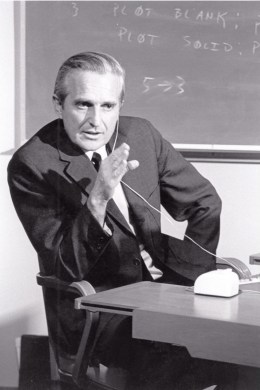
Douglas Engelbart, inventor of the mouse, on December 9, 1968 -- when only computer scientists who were paying attention knew that he was inventing the future
Christopher Mims of Quartz, like many folks who write about tech, has wrapped up 2013 by reviewing the year’s events. He’s not impressed. Actually, he’s downright merciless, saying that it’s been “a lost year” and “an embarrassment.” His complaints, which are many and varied, include it being a fallow period for smartphones and one in which lots of companies tried their hands at wearable devices but no game-changing device emerged.
His piece sparked conversation — as it was presumably meant to do. (Hey, look, I’m talking about it right now!) GigaOm’s Om Malik responded at length; he thinks that it was a great year for tech, and provides examples ranging from advances in robotics to new sensors such as the M7 chip built into Apple’s latest gadgets.
It’s true that 2013 has been quiet. Tech is most fun when there are brand-new products which (almost) everybody instinctively knows are breakthroughs of both immediate and lasting importance — stuff like the IBM PC (1981), Macintosh (1984), PalmPilot (1996), TiVo (1999) and, of course, iPhone (2007). As far as I can tell, 2013 has offered no such epoch-shifting item: Even if Google Glass eventually turns out to be a hit, it’s still a pilot program rather than a commercial product.
But Om is absolutely right that a high percentage of the most important things that happen in tech aren’t obviously important, or even well-known at all. That’s nothing new. The Mac, for instance, may have been one of 1984’s biggest stories, but it wouldn’t have existed without research conducted by Douglas Engelbart and Ivan Sutherland in the 1960s, which was built upon in the 1970s by brilliant people such as Alan Kay.
If someone writing for a mainstream publication had been summing up any random year in the 1960s or 1970s, the incredibly significant work of people such as Engelbart, Sutherland and Kay would likely have gone unreferenced. In fact, I just checked: Neither TIME nor the New York Times mentioned any of those guys until the 1980s, when it became clear that they would change the world. But the fact that their work had a low profile when it was going on didn’t make it any less important.
The last week of the year is a fine time to recap the news of the last twelve months. And from a news standpoint, 2013 was indeed a letdown, notable more for Edward Snowden’s NSA revelations and the Healthcare.org meltdown than landmark products. Just remember: With tech, even more than most subjects, headlines often fail to reflect progress. If we look back at 2013 in a half-decade or so, the odds are substantial that it’ll look very different than it does to anyone today — including Christopher Mims and Om Malik.


